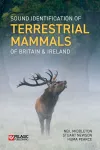
Sound Identification of Terrestrial Mammals of Britain & Ireland
3 authors - Hardback
£49.99
Neil Middleton is a licensed bat worker and trainer, and is the owner of BatAbility Courses & Tuition (www.batability.co.uk), an organisation that delivers ecology-related skills development to customers throughout the UK and beyond. He has a constant appetite for self-development, as well as seeking to develop those around him, and to this end he has designed and delivered in excess of 400 training events covering a wide range of business and ecology-related subjects. Neil has had a strong interest in the natural world since childhood, particularly in relation to birds and mammals. He has studied bats for over 25 years, with a particular focus on their acoustic behaviour (echolocation and social calls).
Other books also available by Neil Middleton:
Social Calls of the Bats of Britain & Ireland (2nd Edition). Pelagic Publishing, Exeter, 2022.
Is That a Bat? A Guide to Non-Bat Sounds Encountered During Bat Surveys. Pelagic Publishing, Exeter, 2020.
The Effective Ecologist – Succeed in the Office Environment. Pelagic Publishing, Exeter, 2016.
Stuart Newson is a Senior Research Ecologist at the British Trust for Ornithology, where he is involved in survey design and data analysis from national ‘citizen-science’ surveys. While birds have been the core of his work, Stuart has an interest in bats and acoustic monitoring – in particular, how technology can deliver opportunities for conservation and provide ways to engage with large audiences. Stuart’s work on bioacoustics has included creating tools to identify European bats, bush-crickets and small mammal species from their ‘calls’. This resulted in the BTO Acoustic Pipeline, which integrates online tools for coordinating fieldworkers, processing recordings, and returning feedback to encourage large-scale participation in acoustic surveys. Stuart is also a member of Natural England’s Bat Expert Panel.
Huma Pearce is a freelance ecologist with a specialist interest in mammals. She has worked on various small and medium sized mammal monitoring projects in the UK and abroad, training students and citizen science volunteers in mammal survey techniques. She developed an interest in bats in 2005, which sparked an interest in sound analysis for species identification and behavioural studies. Huma has since contributed to sound libraries (e.g. BTO Acoustic Pipeline) and has become an advocate for the application of bioacoustics for monitoring bats and other mammals. As such, Huma is never far away from either a recording device, a new site to explore, or the analysis of megabytes of data from previously deployed sessions.